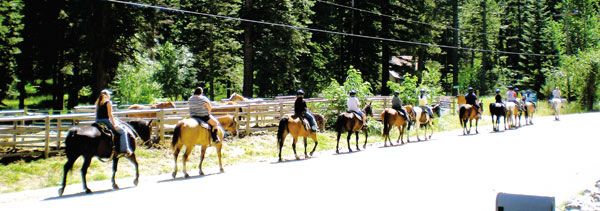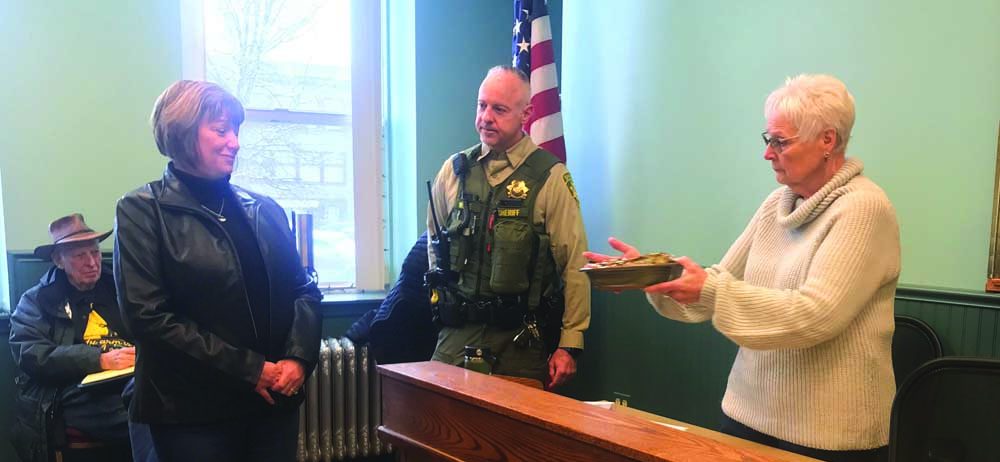Eagle Cap Wilderness Pack Station gives Wallowa Lake visitors an Equine Adventure
Published 10:49 pm Thursday, August 18, 2011

- Wrangler/guides Jackie Hook (left) and Cheyenne Knight (right at the front of the line) take a group of young people from the Nez Perce Culture Camp to the trailhead for a one-hour ride into the wilderness area. Seventy kids were able to ride in groups of six to 10 throughout the day. JOYCE OSTERLOH / The Observer
WALLOWA LAKE
The work day at Eagle Cap Wilderness Pack Station at the south end of
Wallowa Lake starts early and gets busy quickly. The pack station,
owned and operated by Kathleen and Wes Gorbett, provides horseback rides
into the wilderness for anyone willing to try something new from a seat
with a view.
Fifty to 70 horses fill the corrals and catch pens in the chilly morning under the massive pine trees near the end of the road that skirts the lake.
The wranglers halter and lead horses from the corral to the rail where they will be treated to a scoop of grain and then saddled for a day on the trail.
With smooth and unhurried motion, Heather and Haley McDonald, Cheyenne Knight and Dan Bolen shake out the thick blanket pads that go under the saddle. Next with an easy swing, the saddle goes up, lands with a soft thud on the horse’s back and settles into place. The cinches are tightened, a bridle is fitted over the halter and lead rope and the horse is ready to work. This is repeated about 30 to 40 times as the string is readied for the day.
The pack station owns around 70 horses – Kathleen Gorbett isn’t sure exactly how many. About 30 are used per day. Others may be lame, needing a rest or waiting to be shod. She says several people have given them horses that they can no longer take care of and, because the market is depressed, will get very little money for if sold. Most of the pack station horses are between 8 and 18 years old. Kathleen says the older horses that develop a sway back or have a hard time keeping weight on are not used for public rides at the station.
“We have to use really good, solid horses because most people who come to ride have never ridden or even touched a horse before,” Kathleen says.
Riders mount their horses from the loading dock to make getting settled and ready to ride a little easier. Most more experienced riders mount from the ground, stepping into the stirrup with one leg and swinging the other over the horse and into the stirrup on the other side. While the wranglers adjust the stirrups to a comfortable and supportive length for each rider, they give a few simple instructions and ascertain the rider’s level of experience and try to gauge their degree of nervousness.
Riders learn how to turn the horse, stop and make him go. Wranglers lead riders under 10 years old and anyone not comfortable with taking the reins themselves.
The one-hour ride is comprised of a loop out and back from the Wallowa Lake Trailhead. Two-hour rides travel up the east fork of the Wallowa River, and a four-hour ride goes eight miles up the west fork of the river and requires a reservation, as do the all-day rides.
Full-day rides follow the east fork of the Wallowa River to Aneroid Lake. A lunch is provided with several menu options. Wranglers tend the horses to give riders the freedom to hike, fish and enjoy Aneroid Lake.
Wrangler Haley McDonald, a high school student from Gresham whose grandparents live in Enterprise, says she has been around horses all her life and has her own horse. She says she enjoys meeting people from other countries who come to the pack station. She guides group after group onto the wooded mountain trails all day and enjoys her job. What she doesn’t like, she says, is riders behaving in an unsafe manner; trying to make the horse run on the trail or striking the horse with branches to make him go faster.
“Most people are fine by the time we get them in the saddle. But sometimes they are really nervous and just can’t even go on the ride,” Kathleen Gorbett says. “We do our best to give each person a good experience. We want them to have a good time.”
The challenge for the pack station staff is to keep the rides on schedule; get a group mounted and ready to go and on the trail on time and then keep everyone moving so they return on time. If one group is 10 minutes late, it gets the whole day’s rides off schedule. Kathleen says they don’t like to have people waiting for rides, especially if they called in a reservation.
An important point to remember, Kathleen says, is that if someone wants to ride at a specific time, they should call in and reserve a horse and guide, otherwise, there are no guarantees one will be available. Most of the rides that go out all day are walk-in customers who have a flexible schedule.
Backpackers often hire the pack station to haul their packs in to a pre-planned drop site. Kathleen says they usually carry the packs out themselves, or the pack station guides can come back to a camp and haul the gear back down the mountain.
Finding and keeping good guides and wranglers is another challenge for the pack station. It helps if the same crew returns summer after summer, but that isn’t always possible. Besides Haley McDonald, the wranglers are Cheyenne Knight, a teenager from Enterprise; Heather McDonald from Gresham; Daniel Bolen, a high school teacher from Salem who comes back to work at the pack station and at the Wallowa Lake Camp every summer; Challis Gorbett, a family member. Ty Bowman from Pendleton, as well as Abby Sale from Orcas Island, Wash., work as guides for pack trips and care for the mule pack string. Jackie Hook and Teah Evans from Enterprise work part time as wranglers. Ashley Morehouse, Kathleen’s niece, helps in the office.
Kathleen says the station opens whenever the snow melts enough to allow traffic on the trails into the wilderness. Usually that is mid- to late-May, but due to the cold, wet June weather, the season started almost a month late this year. They book hunting trips through the first week of November for rifle elk season. The day rides continue through September, but after Labor Day weekend traffic is pretty slow.
According to previous pack station owner Marlene McDowell, the Eagle Cap Wilderness Pack Station is the longest continuously running pack station business in Northeast Oregon. She owned the business from 1991 to 2010 and said it is a stable business in a great location. In the years she owned and operated the station, through high gas prices and a recession in the 1980s, the visitor numbers remained about the same each season. The number of overnight and longer trips were lower in the lean years, but the short trips increased, she said.
Kathleen says thousands of people ride thousands of miles into the wilderness each year. Many families come back to ride every summer. It is the only time of the year they ever ride, but it is a family vacation tradition.
More information is available on the www.eaglecapwildernesspackstation.com website.





